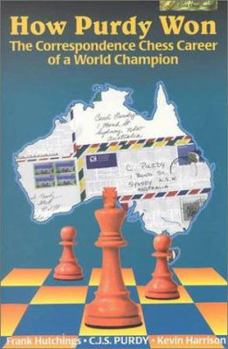How Purdy Won: The Correspondence Chess Career of a World Champion
How Purdy Won recounts the journey of the world's first correspondence chess champion, Cecil Purdy. Included are the hardest games of Purdy's life. Through 6 years of correspondence play, Purdy was... This description may be from another edition of this product.
Format:Paperback
Language:English
ISBN:0938650807
ISBN13:9780938650805
Release Date:October 1998
Publisher:Thinkers' Press
Length:176 Pages
Weight:0.65 lbs.
Dimensions:0.5" x 6.0" x 9.0"
Customer Reviews
2 ratings
A Chess Artist
Published by Thriftbooks.com User , 24 years ago
This is a game's collection of the first World Correspondence Chess Champion from the ICCF. It contains 52 games played between 1934 and 1956, it lists 53 but the gamescore for Wolfers - Purdy is given as unavailable. Of the 52, 26 are annotated by Purdy, 11 by Frank Hutchings and 7 by Kevin Harrison. The co-authors made use of Purdy's notes as available. Eight of the games are unannotated. Purdy was an OTB IM, a GM at Correspodence Chess, and a prolific writer. He regarded OTB chess as "relatively superficial" and correspondence chess as closer to art. He wrote that correspondence chess allowed one to "possess a really deep understanding of the game, and a capacity to play nearly perfect chess when not beset with the handicaps of crossboard play." Purdy exemplified this statement by losing only two games over his entire competitive career and being undefeated for a period of nearly fifteen years. Purdy thought that miscalculations were inevitable in OTB chess and that correspondence chess players have "the time to analyze deeply and the incentive to take that time." Indeed, in one of his games he tempts his opponent into playing a freeing move, because he saw a win nearly twenty moves deep. An original document of Purdy's analysis shows him considering twenty alternatives on his fortieth move in a major piece ending with three pawns apiece. In an another game, indicative of his eagerness to examine the exception to the rule, Purdy accepts double pawns and four pawn islands, compared to Black's two, to display the power of his Bishop pair. He later sacrifices an exchange, doubling yet another set of pawns, to force home the win. Many of the games are just masterful. The centerpiece of the book has to be the game Bigot - Purdy, which Purdy titled "The Hardest Game of My Life" and designated, according to Tim Harding in Winning at Correspondence Chess, as "the best and most important" game in his chess career. A premature pawn advance at move 13 gives Purdy grim prospects. He toughs out the middlegame at the brink of defeat to find an incredible move resulting in a self-pin. Then down by a pawn in a drawn ending, he swindles his opponent into an inferior continuation by the judicious use of conditional moves and wins. The whole game is annotated over eight pages and includes some analysis busting by Fritz3 published in the magazine Correspondence Chess #131. There are three other games that are each annotated over 7-8 pages as well. When self-improvement books suggest playing over well-annotated games of the masters - this is the kind that they are referring to. After winning the world championship Purdy retired from correspondence play and returned to OTB competition. In fact he died at an OTB competition. His last words being, "I have a win but it will take some time." The openings, some albeit old fashioned, vary widely. Purdy mostly played 1.e4, but also 1.d4 and 1.c4. As Black he played the Slav, the
Another Purdy Classic
Published by Thriftbooks.com User , 26 years ago
Just published(May/June 98) and a fine addition to the Purdy material promised by Thinker's Press. Print, layout, diagrams and proofreading are typical of tpi/Chessco/Bob Long - EXCELLENT. The material is just as good. The games are mainly from Purdy's win of the first World Postal Chess Championship. The playdowns etc began 1947/48 and his win was confirmed in 1953 after playing and beating the cream of correspondence players. His analysis is DEEP and ACCURATE and the editing by his son-in-law Frank Hutchings and others has been done with care and a professionalism that can only be admired. A welcome addition to the line of books that his widow Ann Purdy wanted so much. BUY IT.






